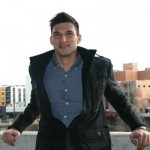“It’s the size of a grapefruit.”
I imagined the bitter, fleshy pink fruit. In my mind’s eye the fruit sat, covered in layer of white, granular sugar, untouched with a silver spoon gleaming beside it. My trance dissipated like a curling cloud of smoke as I listened to my mother’s voice through the phone.
“It doesn’t look good,” she murmured.
I knew it was too late. It was too big. It wasn’t caught soon enough. It was a tumor, and it was draining my last surviving grandparent of her life.
The air was hot and humid, with the smell of food simmering on the stove. It was the kind of air that makes you feel like just one breath could give you a mouthful of whatever was cooking. I walked further into my oma’s kitchen and peered into the bubbling pot on the stove. With her giant spin in her hand, she wagged it towards me as she asked, “Hungry?” with her mouth pulled back into a sly grin.
She already knew the answer; no one could resist her spaetzle dumplings, dripping with browned butter. I gave her a long hug, pressed against the cool silk of the draping mumu that provided her a sort of sanctuary in the hot kitchen. Then I took the heaping plate.
“Wait, so how far along is she? Like, how advanced is it,” I questioned, still in shock, still hoping.
“Honey, she’s very sick.”
“Should I come home? Is it bad?”
“If you can, I think you should come…” To say goodbye?
It wasn’t said, but then again it didn’t have to be. The short exchange, now seared into my memory, was enough to tell me everything I needed to know. Tears began to well in my eyes, salty and stinging as they ran down my face. The cold night air rested on my tear-stained cheeks like a cold kiss, the dark silhouettes of buildings forming a voyeuristic audience to my grief. Almost shocked by the sound of my sobs, I went back to my apartment and feel into my bed.
“Hoopah-radah-ridah-da-felda-in-da-craada. Oops, there goes the baby in-da-craada.”
Memories of lullabies from a foreign land, dripping with harsh German enunciations, dance through my mind as I look at photos of my grandmother, cradling me as a baby. She was there, gazing down at my thick, black hair, my closed eyes, my rosebud lips, cherishing the simplicity of my total innocence. But now I’m here, cradling this photo of her, observing her in her youth. I take notice of her dark hair that’s so much like my own, and her air of seriousness that seems to radiate from the glossy image.
I can’t help but to pause and think of the authority of time.
It never stops—an infallible machine that never needs greasing or turning, wrenching or polishing. Who takes care of time? It certainly doesn’t take care of us. I wondered how long it took for the cancer to metastasize to form the massive tumor, situated atop my oma’s liver. How many seconds, minutes, hours, weeks, it took for the malignant mass to form, and for the cancer to stake its claim.
It took three hours to drive back to Rome, straight to the hospital, when my last class ended on Friday. My mother came to the lobby, to bring me to the sterile hospital room, where my grandmother lay surrounded by family. My mother whispered in my ear, “She doesn’t have long. I didn’t realize she would go this quickly…”
I nodded, and then neared the hospital bed, the ambient lighting casting a glow on my oma’s pale skin. I reached out to touch her hand, still as lovely as it had always been. I heard my aunt murmur, “She’s always had beautiful skin, hasn’t she?” I gazed down at her fingers, interlaced with mine. Over fifty years my senior and little differed between ours, besides my slightly darker complexion.
I gripped her hand a little firmer, feeling the warmth it radiated, wondering if I could feel the blood pulsing through her veins if I was still enough.
Of course, she didn’t stir from her sedated state, propped on her side as to avoid pressing on the painful tumor. All I could do was stare at her, sleeping so peacefully, only the slightest signs of her regular breaths. Inhaling and exhaling, her chest mimicked the ocean tides, and I felt soothed for a little while.
The hardest part wasn’t the funeral. It wasn’t the process of cleaning out her home, full of memories from my youth. It wasn’t that seeing my oma’s twin sister when she came to town was like seeing a ghost. It was saying goodbye to her, in that dimly lit hospital room, knowing that it was the last time. It’s an eerie thing, saying your last goodbyes to someone who is still alive. So unnatural and shocking it seemed to me at the time that I couldn’t utter a simple goodbye out loud.
I turned to my family who watched me as I stood by the hospital bed, and sobbed, “I can’t do it. I can’t say goodbye…” But what I could do was hold her hand, and I did.
This is why I relay.
So that no one else has to feel the pain of saying goodbye, for the last time, to loved one dying of cancer. I relay because cancer has gone too far. It’s taken one too many wonderful beings from this world. For all those who are battling cancer, know someone who is battling cancer, or hope that they will never have either of these connections: I’m implore you to direct your passion to this cause. Whatever your motives are, everyone who relays has the same goal—to beat cancer.
We can.



